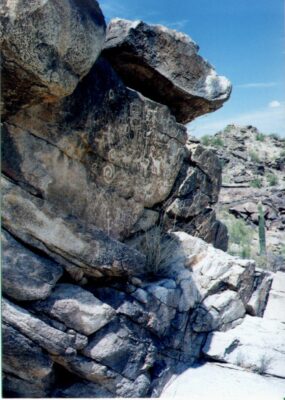Aaron Wright – “The Ritual Practice of Hohokam Rock Art in the Phoenix Basin”

The more than 7,000 petroglyphs in the South Mountains, nestled at the confluence of the Salt and Gila Rivers, are the largest concentration of rock art in the Hohokam core area. And while the petroglyphs are well known, their contexts have not received much consideration until now. Recently published research takes a close look at these contexts in order to refine the Hohokam rock art chronology and bring to light their ritual nature. In terms of time, four relative measures reveal shifts in petroglyph iconography roughly congruent to those observed on decorated pottery. They further bracket the origin for most, perhaps even all, of the South Mountains petroglyphs to the Hohokam Preclassic era, circa A.D. 450-1050.
Of sociological significance, this study employs a model of ritual structure and practice to delineate how, in which ways, and to what extent the production and consumption of Hohokam rock art were ritualized. Results suggest residents of nearby villages crafted petroglyphs in at least seven different landscape settings, each of which evidences different degrees of ritualization. This variability, coupled with the general openness and accessibility of the rock art, argues against its authorship by religious specialists, i.e., shamans, and suggests a more equitable distribution of religious knowledge and ritual power within Hohokam communities. An ebbing, or even end to, petroglyph ritualism at the beginning of the Classic period, coincident with the rise of platform mound ceremonialism, nonetheless shows that a centralization of ritual power and religious authority was instrumental to the Preclassic-Classic social transformation.
Copies of Aaron’s new book “Religion on the Rocks: Hohokam Rock Art, Ritual Practice, and Social Transformation” will be available at the lecture for $52.00, a 20% discount of the the list price of $65.00. Cash or Check only.
 All Posts
All Posts